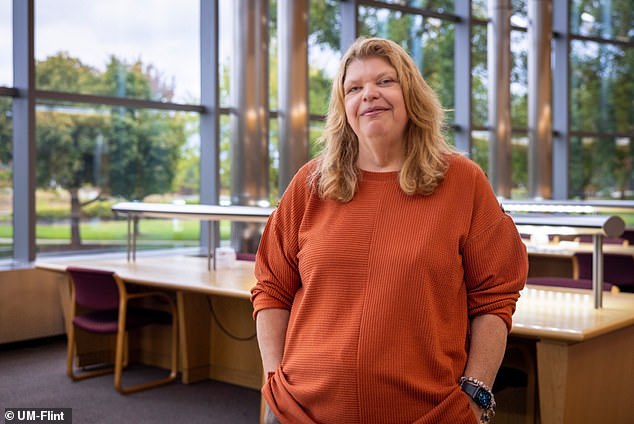The Daily Observer London Desk: Reporter- John Furner
A woman in Michigan who thought she had an ear infection was shocked when doctors found her symptoms were caused by a brain tumor.
Annette Courtier, in her 50s and from Lansing, went to doctors complaining of pain in her head and around her ear.
Scans revealed, however, that she had a non-cancerous growth on her pituitary gland, which is a pea-shaped structure at the bottom of the brain. Doctors said it had likely been growing for five years.
Annette Courtier, in her 50s and from Lansing, Michigan, was diagnosed with the brain tumor after thinking she had an ear infection
She underwent surgery to remove the growth and a week later was back to doing homework for her college course. She graduated with her year group on time despite the diagnosis.
The tiny pituitary gland plays a critical role in regulating hormones in the body involved in functions including growth, reproduction and appetite.
About 10,000 Americans are diagnosed with pituitary brain tumors every year, making up 17 percent of all brain tumors recorded.
The vast majority of patients survive, with 97 percent living more than five years after their diagnosis.
Ms Courtier lost her sister to stage four cancer in 2019, which took her to a ‘very dark place’ because her sister was the ‘closest person to me’.
But in 2022 she decided to return to college 35 years after leaving high school, enrolling at the University of Michigan-Flint to study digital communication.
A week into the course, however, she started experiencing pain in her head which led to the diagnosis.
Most pituitary gland tumors are removed using transsphenoidal surgery, where doctors put an endoscope and specialized surgical instruments up the nose and through the sphenoid sinus — an area behind the nose — to access the gland.
They then cut out the tumor either whole or in parts.
After her surgery, Ms Courtier said: ‘Having brain surgery, recovering from brain surgery, going back to work. All of those things.
‘I don’t think I would’ve done anything differently.
‘I didn’t give myself time to dwell on it because it wasn’t necessary.’

The above shows how Ms Courtier received surgery for the brain tumor, which is normally removed via devices being stuck through the nose to access the tumor
She added: ‘A brain tumor doesn’t stop your life. Your life is what you make of your life, and that’s what I did.
‘Brain surgery, full-time work, full-time school, losing a hundred pounds in six months — it’s been quite a year.
‘I’m a completely different person than when I started the program.’
Symptoms of pituitary tumor include weight loss, headaches, excessive sweating and shifts in appetite.



